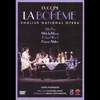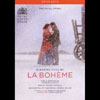Puccini (La) Bohème
Two recent Bohèmes from London’s two major opera houses go head to head
View record and artist detailsRecord and Artist Details
Composer or Director: Giacomo Puccini
Genre:
DVD
Label: NVC Arts
Magazine Review Date: 12/2010
Media Format: Digital Versatile Disc
Media Runtime: 120
Mastering:
Stereo
DDD
Catalogue Number: 5186 59489-2

Tracks:
| Composition | Artist Credit |
|---|---|
| (La) Bohème, 'Bohemian Life' |
Giacomo Puccini, Composer
Alfie (Alfred) Boe, Rodolfo, Tenor English National Opera Chorus English National Opera Orchestra Giacomo Puccini, Composer Melody Moore, Mimi, Soprano Miguel Harth-Bedoya, Conductor |
Composer or Director: Giacomo Puccini
Genre:
DVD
Label: Opus Arte
Magazine Review Date: 12/2010
Media Format: Digital Versatile Disc
Media Runtime: 121
Mastering:
Stereo
DDD
Catalogue Number: OA1027D

Tracks:
| Composition | Artist Credit |
|---|---|
| (La) Bohème, 'Bohemian Life' |
Giacomo Puccini, Composer
Giacomo Puccini, Composer |
Author: John Steane
“Bohème is a winner: Bohème never fails.” No, and it doesn’t fail now; it doesn’t succeed very brilliantly either. The Covent Garden production has been with us since 1973; the ENO version is new. The first has not survived so long without good reason. John Copley’s producing hand is sure in its touch, and Julia Trevelyan Oman’s sets have become so well loved that it will be a day of mourning when they are (as I suppose must happen sometime) chopped up and used for firewood. At ENO, a Jonathan Miller production is always an event, and we read that this time he has been called in specifically “to refresh Puccini’s enduringly popular masterpiece”. At Covent Garden many of the world-famous singers of the past 30 years have been inhabitants of that attic and clients of the thriving Café Momus. No illustrious names adorn the cast-list of December 2009, nor do they seem likely to be among the stars of the future, generally pleasing as they no doubt are. ENO features at least two of their main attractions among current singers, and both sing well here. Andris Nelsons at Covent Garden conducts a well-paced performance; at ENO Miguel Harth-Bedoya favours slow speeds, especially in the last act, and confers no favours in doing so.
Of the two, ENO’s is of the greater immediate interest. Melody Moore gives a fine all-round performance as Mimì; Alfie Boe, as Rodolfo, only sings well. He sings well, that is, in the essential respects of having an attractive, well-placed lyric voice, firm in production and in drawing an even vocal line. But his evenness extends to an unvaried tone and an inexpressive style. The American soprano is naturally expressive and on this showing would appear to be one of the best of today’s younger singers. Of the other principals, Roland Wood (the Marcello) is seriously disappointing, his voice loose in its vibrations and his stage personality dull and heavy. The Musetta, Schaunard and Colline are likeable. The real stars are the veterans: Simon Butteriss a touchingly Wellesian Benoit and Richard Angas a put-upon Denis Healey figure as Alcindoro.
If the production was not by Jonathan Miller it would hardly deserve comment. Conventionally, and pointlessly, it updates the opera, this time to, at a guess, the mid-interwar years, making a nonsense (for instance) of the business of candles in Act 1. One effect is to make the “Bohemians” utterly unbelievable, an effect amplified by the industriously rhymed English translation. Several essential moments are muffed (the reconciliation of Musetta and Marcello in Act 2, for example). The idea of showing the steps up to the attic (with characters ascending) weakens Mimì’s entry in Act 1 and Musetta’s in Act 4. The lighting (as represented by the cameras) is sometimes no such thing and in others (Act 3 especially) badly managed.
In all matters of production the Covent Garden version is vastly preferable – the disincentive to buy being the existence of a better-sung performance, with Cotrubas, Schicoff and Allen, filmed in 1983 (NVC Arts). Here, the Mimì, Hibla Gerzmava, is clear in tone and clean in style, the Rodolfo (Teodor Ilincai) light and unforced but wanting richness. All act naturally and well, Jacques Imbrailo (the Schaunard) with panache. The principal pleasure lies in the re-viewing of these dearly loved sets and the memories they stir.
Discover the world's largest classical music catalogue with Presto Music.

Gramophone Digital Club
- Digital Edition
- Digital Archive
- Reviews Database
- Full website access
From £8.75 / month
Subscribe
Gramophone Full Club
- Print Edition
- Digital Edition
- Digital Archive
- Reviews Database
- Full website access
From £11.00 / month
Subscribe
If you are a library, university or other organisation that would be interested in an institutional subscription to Gramophone please click here for further information.




